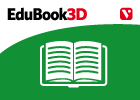Cargando...
Recursos educativos
-
Nivel educativo
-
Competencias
-
Tipología
-
Idioma
-
Tipo de medio
-
Tipo de actividad
-
Destinatarios
-
Tipo de audiencia
-
Creador
-

Vocabulary (I)
EduBook Organización
- 2037 visitas
The sentences below come from the text. Replace the words in bold with the right ones. My next (voyage) began when I took a job on the ship Adventure. Now I was alone and I was (frightened) . I looked…
-

Pregnancy and birth
EduBook Organización
- 1983 visitas
The start of the pregnancy During sexual intercourse, a man deposits millions of sperm into a woman's vagina. The sperm have tails, which help them to move. They travel from the vagina to the uterus…
-

-

Comprehension check
EduBook Organización
- 1 lo usan
- 1795 visitas
Match the following sentences with their endings. Gennaro received a letter Gennaro and Gorgiano fought a lot The Red Circle blackmailed rich Italians Tito Castalotte did not want to pay the Red Circle…
-

Minerals (I)
EduBook Organización
- 1967 visitas
2.1. What is a mineral? Minerals are solid and inorganic substances which have a particular chemical composition. They are formed naturally. Minerals are characterised by their perfectly ordered…
-

-

About the Author
EduBook Organización
- 1991 visitas
William Sydney Porter’s pen name was O. Henry. He was born on September 11, 1862 in Greensboro, North Carolina, a state in the southern part of America. He was born about three years before the…
-

Moss and soil
EduBook Organización
- 1944 visitas
Mosses have a very important ecological role. They actively participate in forming the soil and prevent it from eroding and drying up: The rhizoids help to break down rock into small particles. When the…
-

Unit 1: Matter and Materials
EduBook Organización
- 1940 visitas
Alloy (n): a homogeneous mixture made up of metals or of a metal and a non-metal. atom (n): the smallest unit of matter, composed of particles called protons, neutrons and electrons. boiling point (n):…
-

Everyone, everything, everywhere
EduBook Organización
- 1969 visitas
Complete the sentences with everyone, everything or everywhere. We use everyone when we talk about ‘all the people’. We use everything when we talk about ‘all the things’. We use everywhere when…
Te estamos redirigiendo a la ficha del libro...







